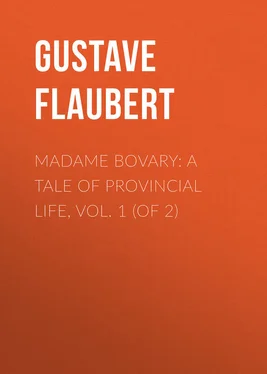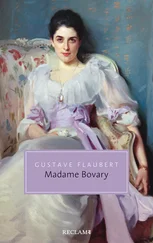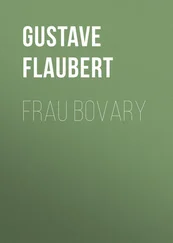Gustave Flaubert - Madame Bovary - A Tale of Provincial Life, Vol. 1 (of 2)
Здесь есть возможность читать онлайн «Gustave Flaubert - Madame Bovary - A Tale of Provincial Life, Vol. 1 (of 2)» — ознакомительный отрывок электронной книги совершенно бесплатно, а после прочтения отрывка купить полную версию. В некоторых случаях можно слушать аудио, скачать через торрент в формате fb2 и присутствует краткое содержание. Жанр: foreign_antique, foreign_prose, на английском языке. Описание произведения, (предисловие) а так же отзывы посетителей доступны на портале библиотеки ЛибКат.
- Название:Madame Bovary: A Tale of Provincial Life, Vol. 1 (of 2)
- Автор:
- Жанр:
- Год:неизвестен
- ISBN:нет данных
- Рейтинг книги:5 / 5. Голосов: 1
-
Избранное:Добавить в избранное
- Отзывы:
-
Ваша оценка:
- 100
- 1
- 2
- 3
- 4
- 5
Madame Bovary: A Tale of Provincial Life, Vol. 1 (of 2): краткое содержание, описание и аннотация
Предлагаем к чтению аннотацию, описание, краткое содержание или предисловие (зависит от того, что написал сам автор книги «Madame Bovary: A Tale of Provincial Life, Vol. 1 (of 2)»). Если вы не нашли необходимую информацию о книге — напишите в комментариях, мы постараемся отыскать её.
Madame Bovary: A Tale of Provincial Life, Vol. 1 (of 2) — читать онлайн ознакомительный отрывок
Ниже представлен текст книги, разбитый по страницам. Система сохранения места последней прочитанной страницы, позволяет с удобством читать онлайн бесплатно книгу «Madame Bovary: A Tale of Provincial Life, Vol. 1 (of 2)», без необходимости каждый раз заново искать на чём Вы остановились. Поставьте закладку, и сможете в любой момент перейти на страницу, на которой закончили чтение.
Интервал:
Закладка:
But a peculiarity of Flaubert's, – and one more personal, which even most of the naturalists have not shared with him, neither the Dutch in their paintings, nor the English in the history of romance (the author of Tom Jones or of Clarissa Harlowe ), nor the Russians, Tolstoi or Dostoiefski, – is to despise the rôle of irony in art. "My personages are profoundly repugnant to me," he wrote, à propos of Madame Bovary . But they were not always repugnant to him, at least not all of them, and, in verification of this, we find that he has not for Spendius, Matho, Hamilcar, and Hanno, the boundless scorn that he affects for Homais or for Bournisien, for Bouvard or for Pecuchet.
We recognise here the particular and special form of Flaubert's pessimism. That there could be people in the world, among his contemporaries, who were not wholly absorbed and preoccupied with art, surpassed his comprehension, and when this indifference did not arouse an indignation which exasperated him even to blows, it drew from him a scornful laughter that one might call Homeric or Rabelaisian, since it incited more to anger than to gaiety. And this is the reason why Madame Bovary , Education Sentimentale , Un Cœur Simple , and Bouvard et Pecuchet would be more truly named were they called satires and not representations.
The exaggeration of the principle here recoils upon itself. That disinterestedness, that impartiality, that serenity which permitted him to "hover impartially above all objects" deserted him. A satirist, or to be more exact, a caricaturist, awoke within the naturalist. He raged at his own characters. He railed at them and mocked them. The interest of the representation had undergone a change. He was no longer in the attitude of mere fidelity to facts, but in a state of scorn and violent derision. Homais and Bournisien are no longer studies in themselves, but a burden to Flaubert. His Education Sentimentale , in spite of him, became, to use his own expression, an overflow of rancour. In Bouvard et Pecuchet he gave way to his hatred of humanity; here, as a favour, and under the mask of irony, he brings himself into his work, and, like a simple Madame Sand, or a vulgar De Musset, we perceive Flaubert himself, bull-necked and ruddy, with the moustaches of a Gallic chief, agonizing at each turn in the romance.
It is not necessary to exaggerate Flaubert's influence. In his time there were ten other writers, none of whom equalled him, – Parnassians in poetry, positivists in criticism, realists in romance or in dramatic writing, – who laboured at the same work. His æstheticism is not his alone, yet Madame Bovary and Salammbô shot like unexpected meteors out of a grey sky, the dull, low sky of the Second Empire. In 1860 the sky was not so grey or so low; and the Poèmes Antiques of Leconte de Lisle, the Études d'histoire religieuse of Renan, and the Essais de Critique of Taine, are possibly not unworthy to be placed in parallel or comparison with the first writings of Flaubert. An exquisite judge of things of the mind, J. J. Weiss, very clearly saw at that time what there was in common in all these works, in the glory of which he was not deceived when he added the Fleurs du Mai by Charles Baudelaire, and the first comedies of Alexandre Dumas fils . But the truth is, not one of these works was marked with signs of masterly maturity in like degree with Madame Bovary .
It is, then, natural that, from day to day, Flaubert should become a guide, and here, if we consider the nature of the lessons he gives, we cannot deny their towering excellence.
If there was need to agitate against romanticism, Madame Bovary performed the duty; and if in this agitation there was need to save what was worth salvation, Salammbô saved it. If it was fitting to recall to poets and to writers of romance, to Madame Sand herself and Victor Hugo, that art was not invented as a public carrier for their confidences, it is still Flaubert who does it. He taught the school of hasty writers that talent, or even genius, is in need of discipline, – the discipline of a long and painful prenticehood in the making and unmaking of their work. He has widened, and especially has he hollowed and deepened, the notion that romanticism was born of nature, and, in doing this, has brought art back to the fountain-head of inspiration. His rhetoric and æstheticism brought him face to face with Nature, enabled him to see her, a gift as rare as it is great, and to "represent" her – the proof of the preceding. It is the artist that judges the model. Poets and romance-writers, like painters, we value only in as much as they represent life – by and for the fidelity, the originality, the novelty, the depth, the distinction, the perfection with which they represent it. It is the rule of rules, the principle of principles! And if Flaubert had no other merit than to have seen this better than any other writer of his age, it would be enough to assure for him a place, and a very exalted place, in the Pantheon of French Literature.
BIOGRAPHICAL PREFACE
Gustave Flaubert was born at Rouen, December 12, 1821. His father was a physician, who later became chief surgeon in the Hôtel Dieu of that city, and his mother, Anne-Justine-Carline Fleuriot, was of Norman extraction.
Fourth of a family of six children, as a child Flaubert exhibited marked fondness for stories, and, with his favourite sister, Caroline, would invent them for pastime. As a youth, he was exceedingly handsome, tall, broad-shouldered and athletic, of independent turn of mind, fond of study, and caring little for the luxuries of life. He attended the college of Rouen, but showed no marked characteristic save a pronounced taste for history. After graduating, he went to Paris to read law, at the École de Droit. At this time disease, the nature of which he always endeavored to conceal from the world, attacked him and compelled a return to Rouen. The complaint, as revealed after his death by Maxime Ducamp, was epilepsy, and the constant fear of suffering an attack in public led Flaubert to live the life of a recluse.
The death of his father occurring at this critical period, Flaubert abandoned the study of law, which he had begun only in obedience to the formally expressed wish of his family. Having a comfortable income, he turned his thoughts to literature, and from that time all other work was distasteful. He read and wrote incessantly, although at this period he never completed anything. Among his papers were found several fragments written between his eighteenth and twentieth years. Some bear the stamp of his individuality, if not in the substance, which is romantic, – at least in the form, which is peculiarly lucid and concise, – for instance, the slight, romantic, autobiographic sketch entitled Novembre .
Flaubert wrote neither for money nor for fame. To him, art was religion, and to it he sacrificed his life. Perfection of style was his goal; and unremitting devotion to his ideal slew him. That he was never satisfied with what he wrote, his letters show; and all who knew him marvelled at his laborious and pathetic application to his work. He settled first in Croisset, near Rouen, with his family, but shortly afterwards went to Brittany with Maxime Ducamp. On his return he planned La Tentation de Saint Antoine , which grew out of a fragmentary sketch entitled Smarh (a mediæval Mystery, the manuscript tells us), written in early youth. La Tentation proved a source of labor, for he never ceased revising it until it appeared in book form in 1874. In 1847, he wrote a modern play, entitled Le Candidat , produced in 1874 at the Vaudeville. It was not his first dramatic effort, as he had already written a sort of lyric fairy-play, Le Château des Cœurs , which was published in his Œuvres Posthumes .
Читать дальшеИнтервал:
Закладка:
Похожие книги на «Madame Bovary: A Tale of Provincial Life, Vol. 1 (of 2)»
Представляем Вашему вниманию похожие книги на «Madame Bovary: A Tale of Provincial Life, Vol. 1 (of 2)» списком для выбора. Мы отобрали схожую по названию и смыслу литературу в надежде предоставить читателям больше вариантов отыскать новые, интересные, ещё непрочитанные произведения.
Обсуждение, отзывы о книге «Madame Bovary: A Tale of Provincial Life, Vol. 1 (of 2)» и просто собственные мнения читателей. Оставьте ваши комментарии, напишите, что Вы думаете о произведении, его смысле или главных героях. Укажите что конкретно понравилось, а что нет, и почему Вы так считаете.












